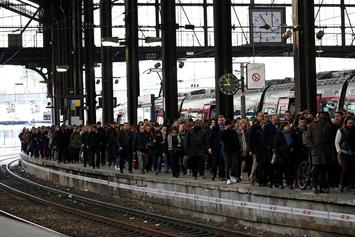
They say Millennials are rejecting capitalism and are drawn to socialism. It’s hard to imagine why, as nearly all the problems they face are caused by bad government policies, not selfish entrepreneurs.
This is most obvious in the field of transportation, where the public takeover of mass transit led to a 50 percent decline in productivity even as per capita transit ridership continued to fall. Yet proponents of socialized transportation argued that Europe was subsidizing their urban transit and intercity trains, so we should too. This took on special urgency as France and other countries built high-speed rail lines, creating an impression that the United States was somehow eating their technological dust.
Now, the New York Times admits the truth, which is that the French government-owned railroad, SNCF, is “heavily subsidized and deeply indebted.” Although such subsidies and debt are not supposed to exist under European Union rules, and the EU has even ordered member states to open up their railways to competition, SNCF has been particularly resistant to that policy.
Now French president Emmanuel Macron has decided to take on the SNCF unions, whose members receive “more generous benefits than almost any other workers, including a guarantee of early retirement,” says the Times. Not surprisingly, this has led to protests, strikes, cancellation of trains, and walkouts by allied unions such as air traffic controllers. Clearly, the French model for rail transportation was financially unsustainable, yet workers are unwilling to give up their privileges in order to fix the problems.
Currently, SNCF has debts of $55 billion. This doesn’t count at least $8.4 billion worth of debt that the government had previously absorbed into the national debt. Most of this debt came from building high-speed rail lines.
The latest data from the European Union say that French trains carry about 9.9 percent of surface passenger travel. While this is up from 9.3 percent in 1990, all of that increase is at the expense of buses, whose share declined from 6.0 to 5.3 percent in the same time period. In other words, all of those tens of billions of dollars did not net a single car off the roads.
Meanwhile, French trains carry less than 11 percent of freight, as more than 86 percent of freight is transported on highways. Those numbers are in sharp contrast to the U.S., where at least a third of freight goes by rail and less than 40 percent goes by truck (and I suspect a bad model has erroneously exaggerated the role of trucks).
American railroads are a model of capitalism, one of the least-subsidized forms of transportation in the world. They are profitable and do far more for the national economy than Europe’s socialized railroads, which mainly serve narrow elites.
Media reports suggest that Macron is losing his fight with the unions. Instead of arguing over pay, he should just privatize the railroad and let the unions deal with the new owners.
In any case, there are plenty of real-world examples of the failure of socialism, and plenty of examples of the success of capitalism. Next time a Millennial uses their smart phone, gets in a car, or places an order with Amazon, they should thank capitalism, while the next time they complain about high housing prices or disrupted transit services, they should thank government planners.
This piece first appeared on The Antiplanner.
Randal O’Toole is a senior fellow with the Cato Institute specializing in land use and transportation policy. He has written several books demonstrating the futility of government planning. Prior to working for Cato, he taught environmental economics at Yale, UC Berkeley, and Utah State University.
Photo: Hürriyet Daily News.












